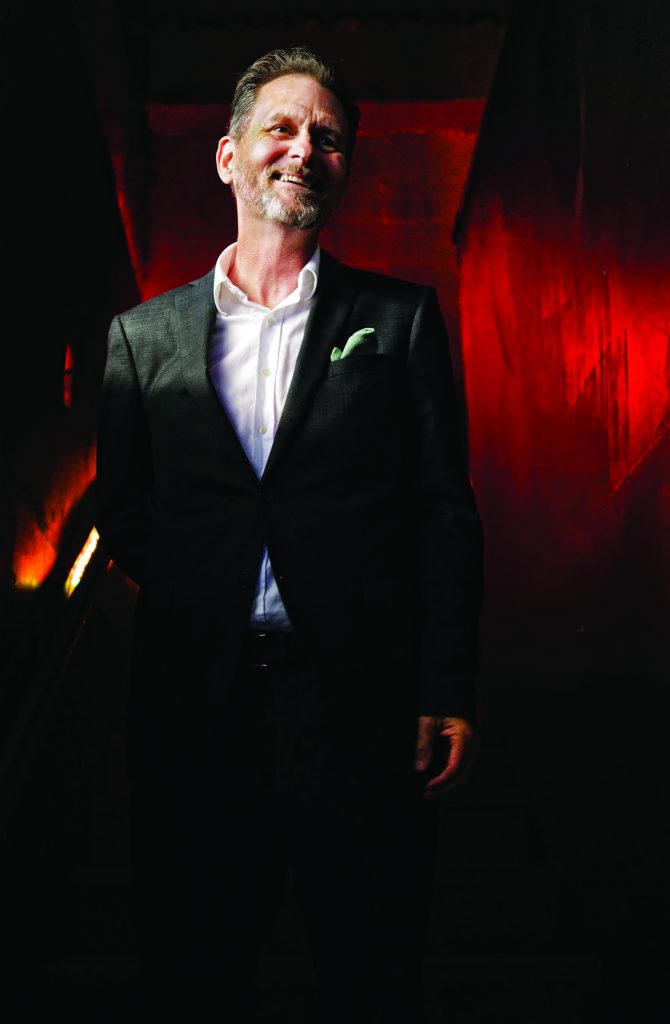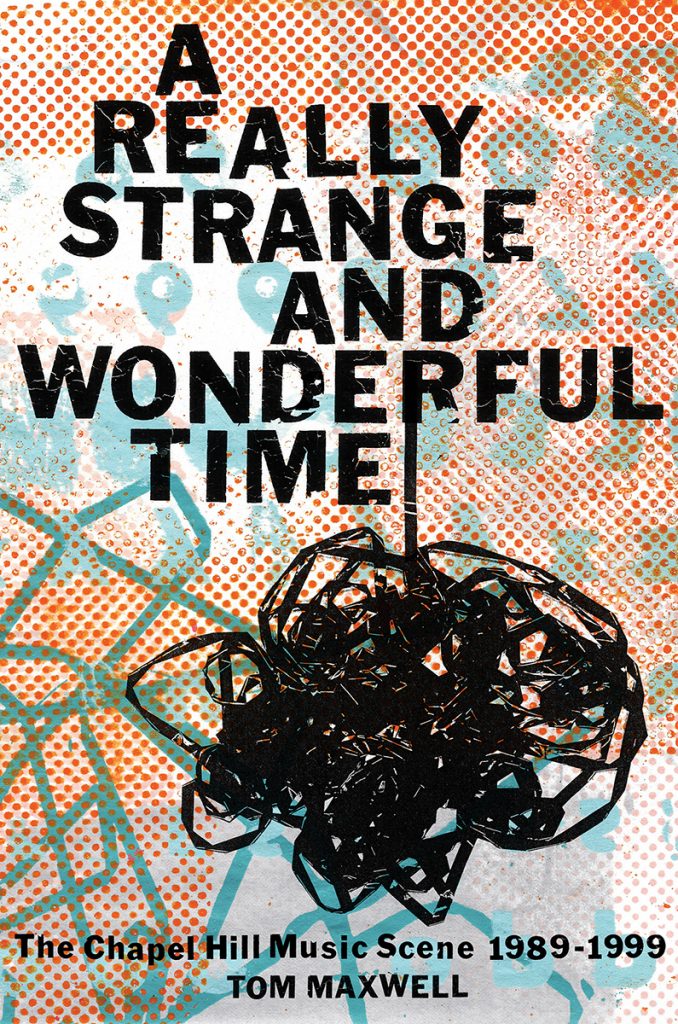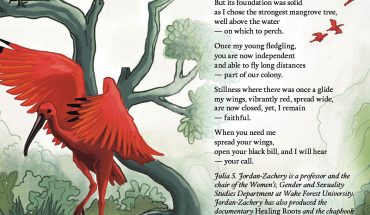The musician best known for his work in the Squirrel Nut Zippers wrote a book about the alternative rock scene in Chapel Hill in the 1990s.
by David Menconi | photography by Michael Benson
Way back in the mid-1990s, a book publisher tried to get Tom Maxwell to write a “memoir in progress.” Maxwell played in Squirrel Nut Zippers, whose hot jazz was starting to resonate with audiences even before the Chapel Hill group’s 1997 calypso hit “Hell” (written by Maxwell) turned them into unlikely platinum-level stars. Maxwell gamely tried to write a few journal entries about life on the road before deciding he just didn’t have the bandwidth to document his Zippers ride while also living through it.
As he puts it: “I was too busy being shot out of a cannon with a drink in my hand.”
Three decades later, however, Maxwell wound up writing that book after all. And it covers not just the Zippers’ story, but the entire scene from whence they came. In 300 pages, A Really Strange and Wonderful Time: The Chapel Hill Music Scene 1989-1999 (Hachette Books) tells the story of a music scene that many participants summarized at the time as “all character, no plot.”
But there’s plenty of plot to Strange and Wonderful. The book covers most of that era’s major flagship acts — Superchunk, Ben Folds Five, Southern Culture on the Skids — along with Archers of Loaf, Metal Flake Mother, Polvo, Zen Frisbee and other local stars and near-stars. It also spotlights some of Chapel Hill’s important cultural institutions, from Cat’s Cradle to the restaurants where so many musicians earned a living between gigs and rehearsals.
“It’s really a love letter to that time and place and people,” says Maxwell. “Chapel Hill was an incredibly sweet spot of cultural abundance, affordability — and walkability. One big reason it worked so well for everyone there was how close together everything was. That’s one reason why the book has a map. This is a Southern story, so it’s very much about place.”
Maxwell grew up in the Western North Carolina hamlet of Burnsville before coming to Chapel Hill in the 1980s to attend the University of North Carolina. But his real education came in local nightclubs.
As drummer in the band Teasing The Korean (later renamed What Peggy Wants), Maxwell was part of a generation of alternative rock bands in Chapel Hill. After the Seattle band Nirvana’s sudden breakthrough in 1991, hard-edged music became commercially viable overnight. Chapel Hill became an indie-rock gold-rush town.
“I grew up in Chapel Hill and there was always a music scene here,” says Steve Balcom, former general manager of the Zippers’ label Mammoth Records. “Then in 1991, suddenly there were all these bands here getting attention and labels flying in to see them. It was kind of insane how it all came together in that era.”
For all the attention and buzz, however, the Chapel Hill acts that would have the most commercial success in that era weren’t the post-punk bands. Instead, it was the Zippers and Ben Folds Five, a piano-
pop trio, both of whom had million-selling albums in the late 1990s.
The Zippers had come together more or less by accident, at a series of potluck parties where indie-rock types got together to play old-style speakeasy jazz. Less a serious band than a tongue-in-cheek art project, the Zippers’ success was the strangest and most wonderful fluke of all — and also a quintessential North Carolina story.
“Culturally, North Carolina artists have always been able to create extraordinary things even while having this beaten-dog self-image,” says Maxwell. “Like we’re not good enough to run with the big dogs even while exporting enormous talents elsewhere. That’s part of what I wanted to accomplish with this book, pointing out something that was ours. It seems overdue. I’m not a team player or parochial guy, but gee whiz, come on.”
Maxwell admittedly has “a famously terrible memory,” so he interviewed every musician, participant and observer he could find from back then (full disclosure: that included me). Last summer, when Cat’s Cradle hosted a raucous memorial wake in honor of Ben Folds Five’s late producer Caleb Southern, Maxwell served as master of ceremonies. Onstage at the start of the night, he looked out at the packed house and declared that he had interviewed “just about every person in this room” for his book.
Much has changed since 1999, and most of the bands covered in Strange and Wonderful are long gone. Maxwell himself doesn’t even live in Chapel Hill anymore, having moved to New Bern and semi-retired from music several years ago (he does plan to perform a few songs at some readings, which will be his first live performances since pre-pandemic times).
Still, vestiges remain. Superchunk and Southern Culture are still carrying on. So is Cat’s Cradle. But there’s no denying how much Chapel Hill has changed.
“I don’t want to be the curmudgeon weeping over the irretrievable past,” Maxwell says. “But the thing I describe in this book will have to appear elsewhere because Chapel Hill has become a gated community. I don’t see how anyone there can work as a dishwasher, live downtown and play in three bands anymore. But is that spirit still there? It must be. UNC is still there, and smart, curious young people are still coming to town.”
This article originally appeared in the April 2024 issue of WALTER magazine.






